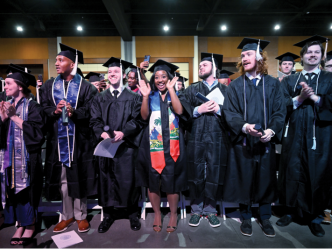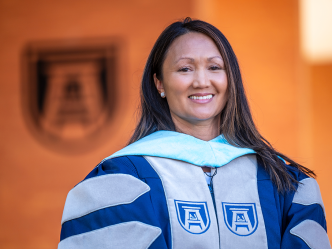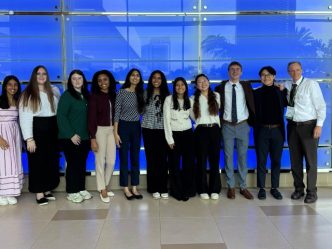Deborah Wiles, renowned author of “Love, Ruby Lavender,” “Aurora County All-Stars” and “Each Little Bird That Sings,” visited Augusta University teacher education students embedded at Lake Forest Elementary School on March 12 to talk about using children’s literature to teach reading.
The visit was part of the AU College of Education’s ongoing partnership with schools in the area. Lake Forest Hills is one of three professional development model sites for undergraduate teacher preparation, at which education students are embedded at a school to provide authentic experiences in implementing teacher preparation coursework.
“For our preservice teachers who are learning about using children’s literature to teach reading, Wiles reminds us that reading is thinking, and that we can imagine and create texts that address our needs in all sorts of innovative ways,” said Dr. Kim Barker, professor of education in the Augusta University College of Education.
Barker received a $1,200 grant to support her research into the use of multi-genre texts such as Wiles’ 60’s trilogy that includes “Countdown,” to improve content knowledge for young readers and for preservice teachers. “Countdown” is a novelization of the Cuban Missile Crisis told from the perspective of an 11-year-old girl in suburban Maryland just outside Andrews Air Force Base.
Wiles shared the process of conceptualizing, scaffolding, writing, editing and publishing the book, an almost 15-year process in partnership with Scholastic. She advised Augusta University students on the writing process, how to plot and structure a story, how to build characters and how to keep work moving forward. She thinks that the root of writer’s block is fear, that incorporating the five senses into every story is essential, and that writing is about a melding of what a writer knows, what a writer feels and what a writer can imagine.
University students asked about the process of constructing the novel, keeping track of her ideas and her methods of incorporating historical ephemera, or memorabilia, into the novel, and Wiles divulged a modern technique she used to construct this historical novel.
“I have a Pinterest board!” she said, scrolling to showcase different collections related to her background work and the content of her books.
Wiles also visited the fifth grade classroom of Lindsay Girosky, one of Richmond County School System’s 2016 finalists for Teacher of the Year and current Augusta University Master of Teaching student. Her students read “Countdown” as part of their curriculum, and devised content area and writing questions for Wiles.
Barker’s research suggests that relating a historical political predicament – like the Cuban Missile Crisis – through the experiences of a protagonist who is around the same age as the intended readers encourages students to engage with the work and unlocks new pathways in the mind for retaining information.
“Anyone who’s around kids much knows that they are experts at multitasking as they gather information. I can’t tell you how many times I’ve seen my own children watching a movie and looking up background information on their phones at the same time. Often they are fact-checking and looking for and sharing information on actors, locations and background context while they watch,” Barker said.
Wiles’ book is the perfect testing ground for Barker’s research, as Wiles created a new format that she calls a documentary novel. The format blends fact and fiction to help readers immerse themselves in history and helps them to learn.
“Multi-genre literature such as Wiles’ Sixties Trilogy incorporates the information-gathering habits of young readers by blending historical fiction with primary source content, such as political cartoons, song lyrics, photos and newspaper headlines. It’s like reading a story and having a scrapbook to go along with it,” Barker said.
And if Girosky’s fifth graders were any indication, Barker’s work will be well proven. The students were armed with their copies of the novel, a board filled with sticky notes on which they had written questions in advance, and a deep knowledge of the content of the book. Twice, in response to a question, Wiles asked, “Did I say that in the book?” to a chorus of affirmations from the students.
The visit also served another purpose, which is to break down the barriers between interested writers and careers in writing.
“For schoolchildren, meeting people who have successful careers demystifies their work and creates an access point to new pursuits,” Barker said.
Deborah Wiles an award-winning author and two-time National Book Award finalist. She earned her Master of Fine Arts in writing from Vermont College, and has taught writing techniques for Towson University and Lesley University. She lives in Atlanta, Georgia.
 Augusta University
Augusta University




